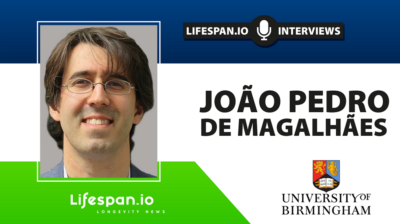David Sinclair and Peter Attia Co-chair $200m Biotech SPAC
- Another company takes the SPAC track to healthy longevity.

Another special purpose acquisition company (SPAC) focused on longevity and rejuvenation biotechnology has appeared recently, and with the addition of research rockstars David Sinclair and Peter Attia, it could mean a bright future for healthy longevity.
We recently talked about how SPACs could transform the longevity research industry in Humacyte in Deal to Develop Prosthetic Vasculature, and now a second company has taken the SPAC route to market.
What is a SPAC?
A special purpose acquisition company, or SPAC, is, in essence, a shell company created by investors with the singular purpose of raising money via an initial public offering (IPO) to eventually acquire another company.
A SPAC has no commercial operations, nor does it make products, and it does not sell anything. In fact, a SPAC’s only assets are usually the money raised within its own IPO, according to the SEC. A SPAC is typically created, or sponsored, by a group of investors, Wall Street professionals, or hedge funds. It is even possible for high-net-worth individuals to create SPACs, and Richard Branson is one such recent example of this practice.
The SPAC deal could potentially make it easier for Frontier Acquisition Corporation to go public compared to traditional methods. An advantage of taking the SPAC route over the traditional IPO is that it gives the company more time to pitch to investors and potentially get them on board.
More about Frontier Acquisition Corporation
Frontier Acquisition Corporation recently announced the pricing of its initial public offering of 20,000,000 units at a price of $10.00 per unit. The units are listed on the Nasdaq Capital Market and will trade under the ticker symbol FRONU.
The SPAC is led by Chief Executive Officer Christian Angermayer, Co-Presidents Rick Gerson and Ryan Khoury, and Co-Chairmen of the board David Sinclair, Peter Attia and director Jonathan Christodoro. The SPAC is certain to have a strong focus on longevity and companies developing ways to increase healthy human lifespan, given the board members.
For a start, Christian Angermayer, the founder of Apeiron Investment Group and Chairman and Co-Founder of Cambrian Biopharma, is leading the SPAC, and his views on healthy longevity are very clear.
In an article published on Linkedin Pulse, he stated, “And gradually, it will go further than just money. I believe we will finally see AGING and DYING officially recognised for what they are: a collection of diseases that can be prevented, cured and reversed.” He goes on to openly state his desire for increased healthy longevity thanks to science: “Put simply, I want to live forever! And in perfect health! And it is my sincere belief that we will achieve the means to do this within the next 20-30 years.”
The SPAC stated in its recent press release that it “intends to pursue opportunities at the intersection of the healthcare and technology industries” but that it “will not be limited to a particular industry or geographic region in its identification and acquisition of a target company.”
Focusing on increasing healthy longevity
Perhaps the most interesting news here is the inclusion of David Sinclair and Peter Attia, two big names in the aging research and longevity field.
David Sinclair, Professor of Genetics at Harvard Medical School, is perhaps best known for his research on nicotinamide adenine dinucleotide (NAD+) and the NAD+ precursor molecule nicotinamide mononucleotide (NMN).
David Sinclair and his team successfully launched the NAD+ Mouse Project with us here on Lifespan.io in 2018 to find out if NMN could increase healthy longevity in mice. That experiment is still currently in progress at Harvard Medical School, and we hope to bring you some news on progress later this year.
David Sinclair has also co-founded a number of biotechnology companies, including being a board member of Life Biosciences, a company and several daughter companies that all collectively work to address the nine hallmarks of aging. He is also the author of the excellent book “Lifespan – Why we age and why we don’t have to“.
Peter Attia is a practising physician who focuses on the practical application of scientific knowledge to support healthy longevity with the tools we have easily available today. As such, much of his focus is upon lifestyle, exercise, diet, sleep, and fasting as ways to maximize health and decelerate aging as much as possible. This is a sensible strategy given that technologies to increase healthy longevity could start to arrive in the next decade or two, so it’s best to stay alive in good health until then.
He hosts the Peter Attia Drive Podcast, a weekly podcast that focuses on maximizing longevity while taking into account the physical, cognitive, and emotional aspects of health. Peter Attia is also the Chief Medical Officer of the fasting app Zero, an app designed to make fasting for longevity and health purposes both safer and easier.
Conclusion
The creation of another SPAC focused on acquiring promising biotech companies working on targeting aging for increased healthy longevity is an exciting prospect. The fact that more and more money is flowing into the field really shows the sea change that has happened in the last four or five years. It seems that there is now a daily stream of biotech firms that focus on aging and increased longevity, which represents a stark contrast to how things were only half a decade ago.
Aging research, rejuvenation biotechnology, and longevity tech are no longer fringe fields: they are small but growing research fields that are primed to potentially become the largest industry in history. With multiple human trials poised to begin this year and some already in progress, just a single success against human aging will likely open the floodgates for even greater funding to flow into the field. We anticipate that we will be seeing more and more SPACs focused on healthy longevity in the next year or two.







